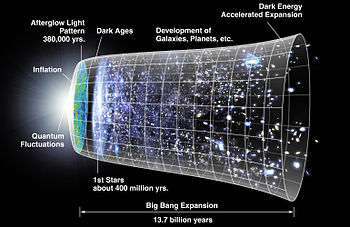How far away are the stars?
Star light must travel through space to reach us, and that takes time, since the light travels at a precise known speed -- about 186,000 miles per second.
I actually did an experiment with rotating mirrors and laser light to measure the speed of light, myself, in sophomore Physics lab in college.
I personally measured it, personally figured out exactly how the geometry of our experiment worked with with a rotating mirror and rotating light interrupters and light splitter, all of it. I saw how each part worked, personally worked out the trigonometry, myself, and how it would lead to what deflection according to the speed of the light in the beam.
So, it's not just hearsay when I tell you -- it is indeed close to 186,000 miles per second.
I know by actual direct observation what is that speed! heh heh
A light year is the distance light will travel through space in one year.
It's about 6 trillion miles.
But more importantly if light come from a star 100 light-years away, then that starlight is already 100 years old as it reaches us.
Because Earth orbits around the Sun, then 6 months apart in time, the Earth is on the opposite side of the Sun compared to a time 6 months before or 6 months after.
That distance, the diameter of the orbit, then causes stars close to us to appear to move their location in the sky compared to stars much further away. You can visualize this if you try, and/or read about it, it is called
"Parallax" -- how a nearer (than most) star appears to be in a different location against the background stars because the Earth has moved.
Hold a pencil 6 or 10 inches from your face, see where the pencil is against a more distant object, and then move your head -- the pencil moves more than the more distant object.
That's parallax.
The exact Parallax of a star is precisely dependent on it's distance, with simple and clear geometry.
Parallax - Wikipedia
So, once we observe the precise parallax of any star that has a detectable parallax, then we know it's precise distance from us.
We can measure parallax using the Hubble space telescope now out to about 10,000 light years.
"In April 2014, NASA astronomers reported that the
Hubble Space Telescope, by using
spatial scanning, can now precisely measure distances up to
10,000 light-years away, a ten-fold improvement over earlier measurements.
[9]"
Next, certain types of stars are extremely predictable, called "Cepheids" -- their light output varies over a period of time, consistently, cycling over and over, that depends on their mass (how heavy they are, how much matter they have).
Cepheid variable - Wikipedia
This method is actually very old stuff in old astronomy books also from way back, which I've read, for example in books where I read it from the 1970s, but also in older books you can find, etc.
So, seeing the Cepheid stars nearer to us (within that 10,000 light years) that also have measurable parallax, we can then find the relationship between the apparent brightness of the Cepheids by mass and their distance.
Then, this relationship, gradually getting better and better over the years, but still with some margin of error, allows us to deduce the rough order of distance to extremely distant Cepheids!!!
See?
We can figure out how far away those very distance Cepheids are!
So, we know there are Cepheids we can be sure are much further away than only 10,000 light years, because we can see their starlight!
Ergo, the Universe is very vast and very old, by direct observation, just with these 2 tools, even before this was all confirmed and refined and extended by other tools.
What other tools?
A very key one is the highly predictable and super extremely bright type
1A Supernovae.
Type Ia supernova - Wikipedia
They allow us to estimate far greater distances.

